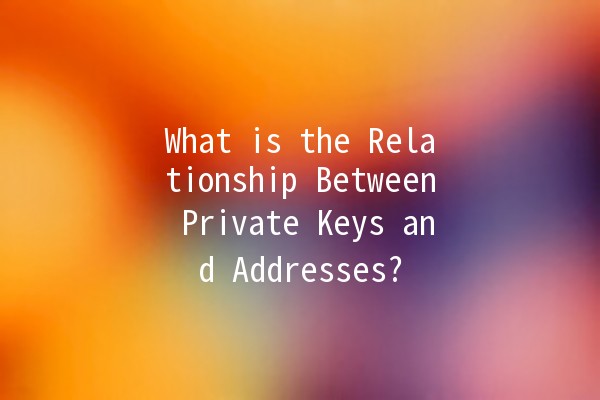
In the world of cryptocurrencies, understanding the relationship between private keys and addresses is paramount. This intricate connection serves as the foundation for secure transactions, enabling users to manage their digital assets safely. In this article, we will delve deep into this relationship, providing practical advice and tips to enhance your understanding and productivity in the crypto space.
The Basics of Private Keys and Addresses
What is a Private Key?

A private key is a complex string of numbers and letters that acts as a password for your cryptocurrency wallet. It is a unique code that grants access to your funds. The private key must be kept secret; anyone with this key can control your crypto assets.
Example: If you visualize a private key as a vault combination, the vault is your digital wallet, and the funds within are your cryptocurrencies. Losing this combination means losing access to the vault.
What is a Public Address?
A public address, on the other hand, is similar to an email address. It is derived from the private key and is meant to be shared. You use it to receive funds, while the private key is used to send them.
Example: If someone wants to send you Bitcoin, they will need your public address, just as someone would need your email address to send you an email.
Relationship Between Private Keys and Addresses
The relationship between private keys and addresses is one of dependence: an address is generated from a private key. This means that for every address, there exists a corresponding private key, but the reverse is not true—one private key can generate multiple addresses.
Technical : The generation of a public address from a private key involves hashing algorithms, most commonly the SHA256 and RIPEMD160 algorithms. This process ensures that while addresses can be widely shared, the private key remains secure.
Importance of Keeping Your Private Key Secure
Consequences of Losing Your Private Key
The ramifications of losing or exposing your private key are severe. Without this key, access to your funds is entirely gone. Furthermore, if someone else obtains your key, they can easily take control of your assets.
Practical Tip: Regularly back up your private key. Store it in a secure physical location, such as a safe, and consider using hardware wallets for added security.
Five Tips to Enhance Your Security and Understanding
Hardware wallets are physical devices that securely store your private keys offline. This prevents exposure to online threats such as hacks or malware.
Implementation: Invest in a reputable hardware wallet, such as a Ledger or Trezor, and follow the manufacturer’s instructions to set it up securely.
While this doesn’t directly protect your private key, enabling 2FA on your cryptocurrency exchanges and wallets adds an important layer of security.
Implementation: Use authenticator apps like Google Authenticator or Authy to generate timebased codes that you’ll need to log in.
Knowing how addresses work is crucial. Each transaction uses the public address to specify where funds are being sent and the private key to authorize the transaction.
Implementation: Take time to explore how transactions are confirmed on the blockchain, including fees and the states involved.
Keep all wallets and software related to cryptocurrencies updated to ensure you have the latest security features and fixes.
Implementation: Subscribe to notifications from wallet providers to be informed of necessary updates.
Only share your public address when it’s necessary and ensure you trust the source. Likewise, never share your private key.
Implementation: Use QR codes for sharing your public address, as they minimize the risk of typing errors and enhance the ease of sharing securely.
Common Questions About Private Keys and Addresses
If you lose your private key, you will lose access to your cryptocurrency holdings. There is no recovery process, as cryptocurrencies are designed to offer true ownership and security.
No, it is mathematically impossible to derive a private key from a public address. The algorithms used in generating public addresses ensure that private keys remain confidential.
Storing private keys online poses significant risks due to hacking. It’s recommended to use offline methods such as hardware wallets or paper wallets.
Once a private key is lost, recovery is impossible unless you have a backup. It’s crucial to create backups regularly and store them securely.
Look for wallets that incorporate strong encryption, provide twofactor authentication options, and have a reputation for security. Research user experiences and reviews to ensure reliability.
A wallet is a software or hardware solution that allows you to store, send, and receive cryptocurrencies. An address, however, is a unique identifier derived from your private key that allows transactions to occur.
Security Practices for Your Private Key and Address
Create a complex password for your wallet. Combine upper and lowercase letters, numbers, and symbols to create a unique password.
Always verify the websites you are logging into. Bookmark your wallet login page to avoid falling for phishing scams.
A multisignature wallet requires multiple keys to authorize a transaction, ensuring added security. This method is particularly useful for business or joint accounts.
Stay informed about the latest security trends in cryptocurrency. New threats and best practices emerge regularly.
For longterm storage, consider cold storage solutions that keep your private keys entirely offline, reducing exposure to online threats.
Understanding the relationship between private keys and addresses is crucial for anyone involved in cryptocurrencies. By implementing the tips and practices outlined above, you can enhance your security and manage your assets more effectively. The world of crypto may seem complex, but with the right knowledge and practices, you can navigate it safely and confidently. Stay educated, practice security diligently, and enjoy the benefits of digital currencies!

